
We all know that our companies need to have a brand identity, this is Marketing 101. What about the personal brands of the folks behind the company? Do the founders need a personal brand? Those are trick questions, because everyone already has a personal brand, whether they are strategic about it or not. What I have found is that a strong personal brand can be a huge asset to your startup’s growth.
Just to clarify, a personal brand is a culmination of how you present yourself to the public at large (or more accurately, how people perceive you). Your LinkedIn profile, your Twitter updates, your blog post, etc., all meld together to form a personal brand.
Some personal brands are weak, as is the case if someone rarely engages on social media, or has a broad diversity of interests that lack a central focus. In contrast, some entrepreneurs have implemented a targeted strategy to build up an audience, which they can then leverage to drive attention to their businesses.
Note: When I speak of social media in the personal brand context, I am not including Facebook profiles, as these tend to be made up of friends and family that would find you weird if you took up a personal brand with them. I am speaking in this article about the public-facing information, that is easily available to those who don’t know you personally.
My Own Experience
Several months ago I decided to make a personal pivot and become intentional about building an audience. My co-founder and I were working on an application (Harpoon), and I wanted to share my experiences along the way. I started blogging regularly, engaging intentionally with people on Twitter, and shaping up my various online profiles. Perhaps this would lead to speaking engagements, or more Twitter followers, but I hoped that it would lead to more awareness of the product that we were building.
Fast forward to today, and looking at my analytics for Harpoon I can see that there is some validity in building a personal brand. While we haven’t had our public launch yet (currently in private beta), I have noticed that our #1 traffic source to the landing pages is referrals:
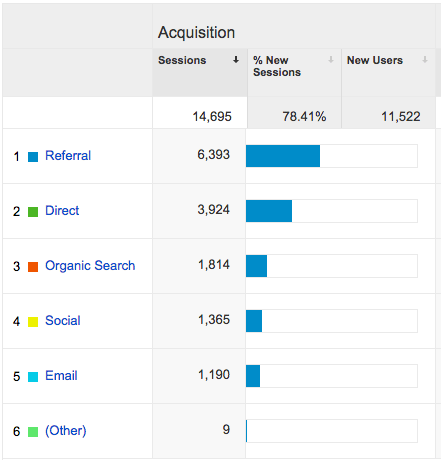
Of those referrals, our #1 source has been my site:
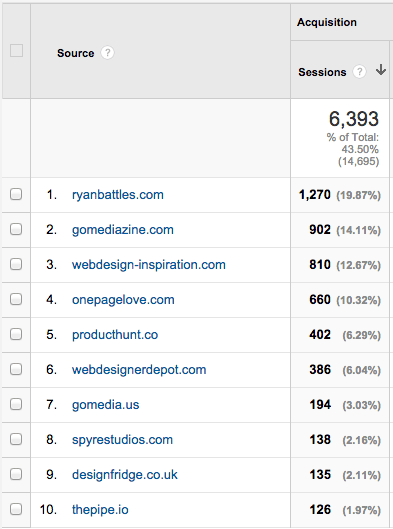
Now, I don’t suppose this will continue once we launch publicly, and ramp up some new marketing channels, but it provides some interesting validation for the effect of a personal brand on our pre-launch growth phase.
It’s Called “Following” Someone for a Reason
Earlier today I was listening to the Product People podcast, where host Justin Jackson interviewed Dan Norris about a product Dan had launched called WP Curve. Dan had been building an audience for a while and having that list made the launch of his new product reach thousands of ears very quickly. Justin comments:
I’ve been on your list for probably 6 months, you send these regular updates, and you’ve been really transparent with Informly…you’d explain how signups are going, you’re frustrations, just really honest…
A lot of us were rooting for you. We’ve built this relationship with you over the time of you just emailing your list.
I can see some people saying: “Yeah, I like Dan, I respect Dan, I know Dan, I’m going to do this because I like him as a person.”
Launching to an audience that already knows you, that follows you, that’s ROOTING for you is one of the most powerful forces in gaining early traction.
As entrepreneur and author Gary Vaynerchuk put it, “Legacy is greater than currency.”
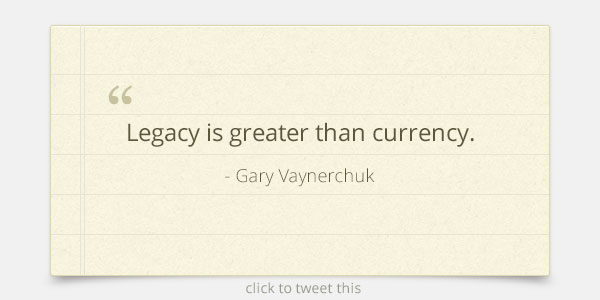
Keeping it Real
When building a personal brand, you start to toe the line against what many refer to as “the sleazy salesman”. You must stay far away from this perception. Here are a few guidelines to keep in mind when building a personal brand:
- Be Authentic – There is only one you, so build your reputation accordingly. Being yourself is the most interesting person you can be.
- Be Transparent – Be just as ready to admit your failures as well as your successes. People don’t relate to perfection.
- Be Helpful – It’s good to promote your own endeavors from time to time, but make sure your social feed exists to provide value to others.
The Benefits of Building a Strong Personal Brand
When people start to see you as a voice in the community, you start getting a whole slew of benefits:
- Your name (and your product) will be referenced in other people’s content.
- Doors will be opened for guest blogging opportunities where you can “borrow” other people’s audience.
- You may even be asked to speak at conferences or be interviewed in podcasts…two great ways to spread the word about your product.
A strong personal brand works as a catalyst for spreading your message. When people know about you, they’ll know about your products as well.
Leveraging Twitter for Your Personal Brand
Twitter is perhaps my favorite network for curating a personal brand. Since I started working intentionally on growing my audience on Twitter, I’ve seen a noticeable growth in followers, favorites, and retweets of my content:
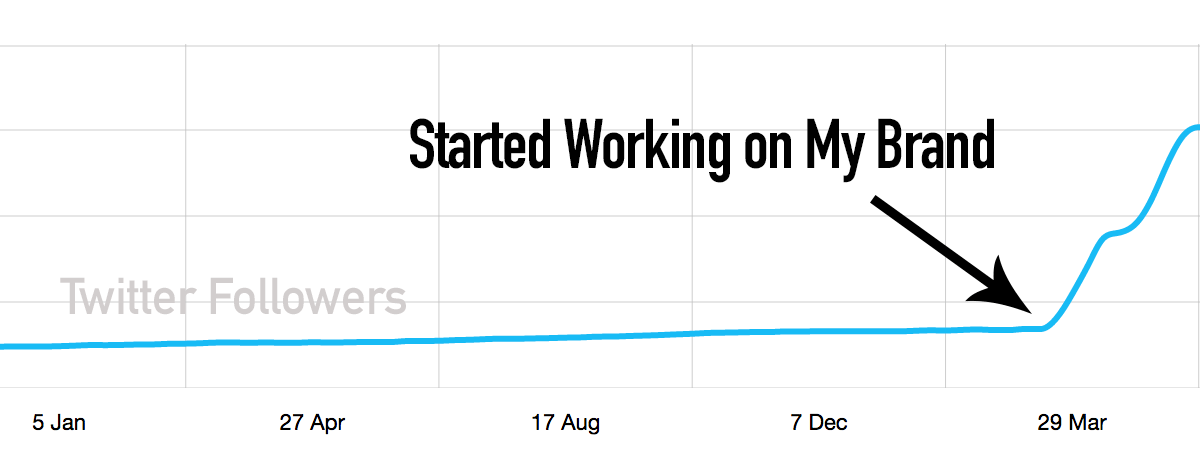
Since this time I have been careful to keep my tweets related to a particular set of subjects (entrepreneurship, productivity, and marketing). As much as I want to lash out and complain about the little annoyances I encounter throughout my day, in the end, I realize that nobody needs to hear more complaints in their life. If it isn’t providing value or entertainment, I try not to tweet it.
Twitter is a great way to interact with people that you normally wouldn’t get the chance to mingle with. I even have a few influential friends that help me promote my blog posts even though we’ve never met in real life, we are friends via Twitter, and help each other out regularly.
With the chaos of a Twitter stream, it can be hard to engage with any specific subset of people. That is unless you utilize Twitter lists! I have a private Twitter list called “Engage with” that is a collection of folks that I’ve noticed have a sphere of influence in the area that I’d like to target as my audience.
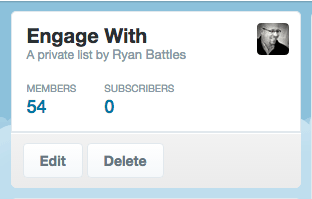
By viewing tweets only from people on that list (something I try to do once or twice a week), I can find opportunities to offer to help them with a question, retweet one of their articles, or connect them with a resource that may be related to what they are talking about.
Do this enough and you’ll notice that some will begin returning the favor. Just don’t be weird or a stalker, but genuinely offer value.
Leveraging Facebook for Your Personal Brand
As I mentioned previously, I try not to use Facebook connections to generate leads, at least not aggressively. However, there is the chance that one of my connections lies within the target audience of my application, or even more likely, that they know someone else who does. I want to be sure that these people think of my application when they are in the market for this solution, but how do I do this without coming across like I’m trying to sell to everyone all of the time?
I try not to mention my businesses or products very often, and when I do, I try to wrap them into a personal update. For example, perhaps I’ll upload a photo of a cupcake with a candle in it, with the caption “Celebrating Harpoon’s 1st anniversary”. This piques interest in your product, without coming across as you are pushing it. Again, the key here is to not talk too much about your business within your Facebook timeline, but don’t ignore that it exists either.
Leveraging LinkedIn for Your Personal Brand
When people browse LinkedIn, typically they are in “research mode”. They are researching updates with contacts, how they know someone, or reading a business-related article in Pulse. Their brains are already attuned to learning about what is out there, so it is the perfect place to build your brand and draw new eyes to your startup.
Along with the standard LinkedIn best practices, like crafting your headline and experience, you can promote your products in the Background section’s photo gallery:

I’ve had numerous people ask me more about Harpoon after seeing my LinkedIn profile, then clicking through to see what each of these products is about.
LinkedIn also allows you to post articles within their network. I have found success by re-posting articles that are a week or two old from my blog, right into LinkedIn, altering the title. This has led to dozens of comments, likes, and shares, as well as thousands of new eyes on my articles. At the end of these posts, I simply place a link to my website, as well as the products that I am building.
Leveraging Quora for Your Personal Brand
Quora is a great site for establishing yourself as a trusted authority. This, in turn, leads to people checking out your products. Noah Kagan from Appsumo describes how he has gained traction there:
I’ve been answering questions on Quora. The result? ~10-15 new people come over to my blog every day. Best part is these are people that are already interested in what I’m writing about: marketing, starting a business, validating ideas. – Noah Kagan (when describing his personal marketing strategy)
With Quora, answers are voted up or down by the community. If you take the time to genuinely answer a question helpfully, there may or may not be the opportunity to link to something on your site that provides more information or related help. Either way, people will see your name and title, and can easily click through to your site via your profile.
Conclusion
Remember, everybody already has a personal brand, the question is whether or not their brand has a strategy behind it. As we’ve seen, a well-executed personal branding strategy can lead to measurable traction with your startup. It can also open doors for whatever else you have going on in the future.